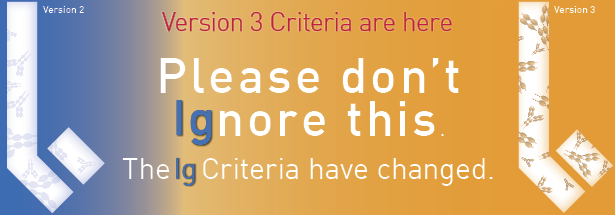Version 3 Criteria Newsletter - February 2019

- Version 3 Criteria
- Transition Historical Review Questions
- Mandatory and Non-mandatory Questions
- Specialist and Consultation Requirements
- Changes to Specialist Requirements
- Why did the Criteria Change?
- Where can I find more information?
- Previous newsletters
- Download
 PDF (255.99 KB) version of the newsletter
PDF (255.99 KB) version of the newsletter
Version 3 Criteria
The Criteria for the Clinical Use of Immunoglobulin in Australia (the Criteria) changed to Version 3 in BloodSTAR on 22 October 2018. As is usual after a major change the National Blood Authority has received a variety of feedback from users and is working hard to provide clarification or implement improvements. This email provides some clarification for common questions relating to Version 3 Criteria.
Version 3 Criteria is available at www.criteria.blood.gov.au
Transition Historical Review Questions
It is important that Ig therapy is directed to those patients where it is likely to be effective and who do not have safe alternative therapies. For many continuing authorisation requests for patients transitioning from Version 2 to Version 3 of the Criteria, medical officers will need to provide some additional historical information about the patient’s diagnosis and initial response to Ig therapy in the form of Transition Review questions. This is to ensure patients transition appropriately to the right indication, and to ensure they are still eligible to receive Ig product under the new Criteria.
The transition review questions will appear only once for each patient who was previously approved for Ig therapy in Version 2. Many of the historical questions are non-mandatory or allow for medical officers to provide a responses indicating the result is not known or wasn’t tested. In most cases a written description can be provided. We ask that medical officers provide the information where it is available, although it is recognised that some patients will have been diagnosed under a different specialist or some time ago and this information may not be readily accessible.
Mandatory and Non-mandatory Questions
While most questions in authorisation requests are mandatory, it is important to note that some are not. Mandatory questions are marked using a red asterisk (*) and BloodSTAR will not allow submission of a request to proceed if these are not completed. Where there is no red asterisk, a response is not mandatory and the submission can proceed.
Specialist and Consultation Requirements
It is a requirement, as outlined in the National Policy: Access to Government-Funded Immunoglobulin Products in Australia (National Policy) and the Criteria, that all patients in BloodSTAR must be treated by a medical specialist; this is called the Treating Medical Specialist.
Most conditions in Version 3 Criteria require a diagnosis or review by a particular type of specialist to access government-funded Ig. The National Immunoglobulin Policy requires all specialists to have their specialist qualification along with the Specialty Field of Practice registered with the Australian Health Practitioner Regulation Agency (AHPRA).
A consultation for diagnosis or review does not always need to take place face to face. A consultation with the appropriate specialist may occur by telephone, written correspondence or video-consultation. These arrangements can be particularly useful for patients who are not located in a metropolitan area so they can receive access to timely treatment.
Please note that it is at the discretion of the consulted medical specialist to accept responsibility for the diagnosis, review or prescription of Ig treatment for a patient. Medical officers completing the authorisation request (Requesting Medical Officer) will receive a warning if they have not selected the required specialist type before submitting. The consulted specialist must be nominated within BloodSTAR on the authorisation request as either:
• the Treating Medical Specialist (TMS), i.e. the patient’s usual specialist;
• the Diagnosing Medical Officer, i.e. the consulted specialist who is responsible for ensuring diagnostic criteria is met (this may be the same as the TMS); or
• the Reviewing Medical Officer, i.e. the consulted specialist who participated in the clinical review of the patient (this may be the same as the TMS).
Changes to Specialist Requirements
There have been changes to the diagnosing or reviewing specialist type for some conditions Version 3 Criteria to access funded Ig. Medical officers completing the authorisation request will receive a warning if they have not selected the required specialist type before submitting.
Remember, you can consult the required specialist type for an Ig authorisation request using telephone, email, written correspondence or video-conferencing. This will reduce treatment delays waiting for appointments.
In some conditions the revised Criteria allow for the diagnosis to be made by additional specialist medical officers who may already manage patients with these conditions which will improve ease of access.
Why did the Criteria Change?
- To align with new evidence
- To ensure those whose health is most likely to be improved with Ig therapy can get it
- To manage the growth in demand for this precious, human-derived product.
Immunoglobulin (Ig) is a precious biological product derived from donated blood plasma, and as such, its use should be consistent with the evidence base and prescribed for the treatment of patients who are likely to benefit from immunoglobulin therapy, and for whom there are no safe and effective alternative treatments.
The significant annual growth in Ig use, the relatively high cost of Ig products and the potential for supply shortages mean that it is important to maintain a focus on ensuring that use remains consistent with an evidence-based approach and that Ig is able to be accessed under the National Blood Arrangements for those patients with the greatest clinical need.
The Criteria describes the conditions and indications for which the use of Ig is appropriate and government funded under the National Blood Agreement. Requests to access publicly funded immunoglobulin products in Australia must be authorised under the Criteria.
The changes to the Criteria will assist with meeting Standard 7 – Blood and Blood Products of the National Safety and Quality Service (NSQHS) Standards.
Where can I find more information?
Version 3 Criteria and supporting information is now available at www.criteria.blood.gov.au. Health professionals can view or print the Criteria by condition, check patient eligibility, review the assessment scales used for neurological conditions and check dosing with the dose calculator.
Detailed information about what changes have been made to the medical conditions within the Criteria is available on the website at www.blood.gov.au/igcriteria-version3. Health professionals can view or print the following:
- Summary of changes by the specialty
- Individual condition factsheets outlining the changes
- Individual conditions as they will appear in the Version 3 Criteria.
Keep up to date
Ig Program Updates provides a snapshot of the NBA’s current work program and priorities in the immunoglobulin space.
To keep up to date with the latest Immunoglobulin Governance Program activities and accomplishments, join the informal subscription-based group: the National Immunoglobulin Interest Group (NIIG). Members of the NIIG receive the NBA’s quarterly Ig Program Updates. They may also be invited to informally contribute to immunoglobulin-related discussions or projects. (Participation is optional.) For more information, see NIIG, or to subscribe, create a BloodPortal account and from the home page click on ‘My Subscriptions’ and ‘Subscribe’ to Ig Program Updates and the National Ig Interest Group (NIIG).
For further information
Please contact the National Blood Authority on 13 000 BLOOD (13 000 25 663) or email IgGovernance@blood.gov.au.

